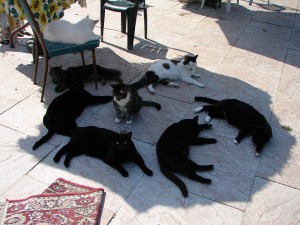energy, drive, push, oomph ![]()
[noun]
[de fut, <no plural>]
When you don't have any "puf" for something, it means you have no energy to do something or that you do not feel up to something. There can also be 'no "puf" in you', meaning there is no push/drive left in you.
You wouldn't talk about a machine consuming too much "puf", in that case we'd say "energie" (energy).
Examples:
– "Had je nog puf om na het werk te gaan sporten?"
("Did you have any energy left to exercise after work?" Literally "to go and exercise / play sports?")
– "Ik heb bijna alles kunnen kopen vandaag, maar ik had geen puf meer om nog naar de drogist te gaan, dat komt dan morgen wel."
("I was able to buy almost everything today, but didn't have the energy left to go to the chemist's / drugstore, I'll have to do that tomomorrow." Lit.: "…, that will come tomorrow." Note that you will also hear "drogisterij" (the ending -ij indicates the place/shop). The 'drogist' can also be the person "chemist/druggist".)
– "Wat is er met Frank aan de hand? Hij heeft nergens meer puf voor en klaagt steen en been!"
("What's wrong with Frank? He doesn't feel up to anything and complains all the time!" The expression 'steen en been klagen' literally translates as 'to complain stone and leg'.)
– "Wandelvakantie? Daar heb ik geen puf meer voor hoor op mijn leeftijd…"
("Hiking trip/holidays/vacation? At my age I don't have the energy left for such a thing." The verb 'wandelen' can both mean 'to hike' or 'to stroll, to go for a walk'.)
– "Wat zit je te puffen?! Heb je nu al geen puf meer?"
("What are you panting for?! Are you already out of energy?")
Related words:
– Energie: energy [noun] [de energie, <no plural>].
– Fut: energy, strength, drive [noun] [de fut, <no plural>]. Used very much the same way as 'puf'.
Example:
– "Natuurlijk kunt u nog op wandelvakantie, er zit nog genoeg fut in u!"
("Of course you can still go on a hiking trip, there is still enough energy left in you!")
– Fit: fit, healthy [adjective].
– Puffen: to pant, puff [verb] [pufte, gepuft].

 “Wat dan nog?” is an alternative to “nou en?” You can use it when you are annoyed, or when you want to say that you think something will not have that much of an influence.
“Wat dan nog?” is an alternative to “nou en?” You can use it when you are annoyed, or when you want to say that you think something will not have that much of an influence. The verb “harden” translates as “to harden”, “to toughen up” or “to bear/stand”. In case of the latter, one often uses the phrase “niet te harden” to say that something is unbearable. This can basically be anything, see the examples.
The verb “harden” translates as “to harden”, “to toughen up” or “to bear/stand”. In case of the latter, one often uses the phrase “niet te harden” to say that something is unbearable. This can basically be anything, see the examples.